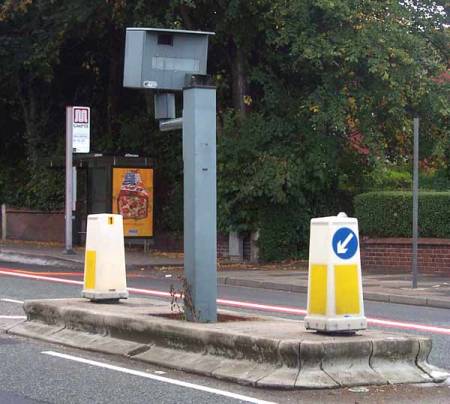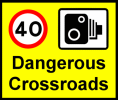A Nice Little Earner?
Will the proliferation of speed cameras really raise millions for Treasury coffers?
Note: This article was written in September 2000, before the Government decision to make all fixed speed cameras highly visible. Rather than attempt to revise it, I have left it in its original form. There is an update to 2005 at Speed Cameras Revisited.

|
The archetypal grey Gatso camera that has become so familiar - and so hated - on our roads |
The installation of large numbers of speed cameras has often been attacked as a way of fleecing even more revenue out of the hard-pressed and over-taxed motorist. In the short term, that may well be true. However, in the longer term, surely the income will steadily tail off as people become more alert to the presence and potential risk from cameras.
Most of us, most of the time, drive along roads we know. We will quickly learn the locations of any speed cameras and adjust our speed appropriately when passing them to avoid being caught. New cameras are normally erected some time before they go live so there is plenty of time to make a note of them.
On strange roads during the daytime you stand a reasonable chance of being able to spot a camera far enough in advance to take evasive action. The presence of cameras is also often indicated by the tell-tale signs of recently-introduced speed limit cuts (or existing limits that are obviously unreasonable) and lots of confusing paint on the roads, which you quickly learn to recognise.
On strange roads at night, spotting cameras well in advance is much more difficult, especially if the road is unlit. However, outside 30 limits, it normally isn't prudent to drive at much above the speed limit anyway in those conditions, except on a few well-aligned dual carriageways, so exercising discretion is not too much of a hardship.
So a reasonably alert driver should stand a good chance of avoiding being caught out by a camera except on rare occasions, although he will need to drive more slowly in many locations than he otherwise might have done. The camera just becomes another hazard to be identified and dealt with appropriately. The more widespread cameras become, the more drivers will realise that they have to watch out for them. Ironically, the hazard perception skills taught on the Institute of Advanced Motorists associate course can also be put to good use in spotting cameras. That is not to say that people will drive more slowly overall, simply be much more on the lookout for cameras. Indeed, where they are confident there are no cameras they may even drive faster as a form of compensation.
If speeding offences only attracted fines, and not penalty points, then the revenue-raising argument would hold some truth. However, the major deterrent is not the fine but the penalty points and the prospect of being banned from driving, which for many would mean losing their livelihood and possibly in the worst cases family breakdown and being evicted from their home.
There are many roads now where, if you came upon them unawares in the dark, you could easily lose your licence in half an hour merely by driving at 10 mph above the speed limit - surely a disproportionate punishment. The A34 south of Stoke-on-Trent and the A523/A52 between Leek and Ashbourne are good examples. Given this, nobody apart from criminals and joyriders can afford to take a cavalier attitude to speed cameras.
Some will argue that the law-abiding driver has nothing to fear from cameras and need make no effort to watch out for them. However, this argument ignores the reality of life on our roads. Many roads have unrealistically low speed limits and the traffic flows at a speed well above the limit without any ill-effects. Speed limits are not clearly signed and may not be at all obvious - for example, what would you think would be the limit on a non-motorway dual carriageway in open countryside, with street lights and no speed limit signs? 70? No - 30. (See Page 26 of the current edition of the Highway Code).
Even if you are doing your best to drive at or around the speed limit, inevitably at some locations your speed will creep up a few mph above it, unless you spend a disproportionate amount of time checking the speedo at the expense of the road ahead. So every motorist is at some level of risk from speed cameras, with the exception of incompetent nerds who struggle to handle a car at the speed limit anyway and probably shouldn't be on the road at all.
There is the further factor that obvious surveillance induces stress even in the wholly innocent. If, for example, whenever you went round the supermarket, you were followed by a store detective who watched your every move, your anxiety level would be considerably increased even if you had no intention whatsoever of shoplifting. Likewise, the presence of a marked police car will cause most drivers to at least cover the brake and check their speedo, even if they believed they were below the speed limit.
By concentrating on artificial hazards, drivers will inevitably pay less attention to genuine ones. There is a role for cameras in ensuring that drivers moderate their speed at locations where there is a history of speed-related accidents, or in ensuring adherence to reasonable speed limits in villages on otherwise fast, open roads. But their role should be entirely as a deterrent, and surely the best speed camera is the one that never catches anyone.
 To this end, every speed camera should be clearly marked with distinctive paintwork, such as yellow diagonal stripes, and identified by specific advance signing stating the reason for the camera and the applicable speed limit, e.g. "Warning: Speed Camera 200 yards. Dangerous bend, speed limit 40 mph". The highway authority should also be required to review periodically whether there any measures that could be taken to reduce the hazard and thus remove the need for the camera.
To this end, every speed camera should be clearly marked with distinctive paintwork, such as yellow diagonal stripes, and identified by specific advance signing stating the reason for the camera and the applicable speed limit, e.g. "Warning: Speed Camera 200 yards. Dangerous bend, speed limit 40 mph". The highway authority should also be required to review periodically whether there any measures that could be taken to reduce the hazard and thus remove the need for the camera.
Now that really would be using cameras to enhance road safety rather than, as at present, to make drivers feel harassed and insecure and encourage them to look out for cameras at the expense of genuine hazards. I genuinely believe that the roads would be safer without 90% of the cameras that have been installed.
However, there is a distinct possibility that all this may become academic. There is a strong body of opinion amongst the legal profession that the new European human rights legislation will prohibit speed camera prosecutions, as they depend upon someone admitting they were driving a car and thereby incriminating themselves. There are a number of test cases in the pipeline. If this opinion proves to be correct, then it will change the whole basis of traffic law and probably lead to a huge backlog of claims for miscarriages of justice. And the police may have to go back to the old method of actually targeting those speeders who are driving irresponsibly and causing a genuine danger on the roads.
(September 2000)
Speed Camera Locations in and around Greater Manchester